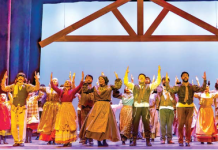By Joan Ellis
Each of us is likely to watch 42 through the prism of our own age.
If you are young or middle age, you have lived on the 21st century side of the civil rights struggle. But if you are old, you will remember well the controversy that filled the air when Jackie Robinson stepped onto the diamond at Ebbets Field as a Brooklyn Dodger in April 1947.
Enormous credit is due writer/director Brian Helgeland for grasping and conveying the atmosphere as it was 66 years ago. He understood that filming the story in contemporary sensibilities would have destroyed its essence. His collaboration with Chadwick Boseman, Harrison Ford and Nicole Beharie brings alive not just a memorable man, but also the dismal state of acceptance in America 82 years after the Civil War.

Try if you can to imagine a time when the thought of a black man on any major league ball field in America was unthinkable. Don’t forget for a minute that 1947 was more than a decade before the Freedom Riders, before the lunch counter, before the bus.
Baseball was macho and white.
Enter Branch Rickey (Harrison Ford). As owner of the Dodgers, he covered an inherent streak of decency with his determination to win games and build a money pile. With one eye on the Negro League, he searched for a man strong enough to break the color barrier in America’s national sport. Robinson had played with white athletes at UCLA and served with whites in the military. He was gifted, and he had edge. A man without edge would have been destroyed. Rickey asked Robinson for stoicism and patience in the face of the hate that he knew would come from fans, managers and teammates. “I want a player who has the guts not to fight back.”
Nicole Beharie’s Rachel conveys her own strength and that of the Robinsons’ marriage in the face of appalling public taunting. Harrison Ford is flawless as the complicated owner who decides to force something the country doesn’t want. In an atypical Ford performance, he creates in Rickey a complex man with a streak of decency that he tries to hide. Chadwick Boseman is terrific as the gifted young player who had to reach deep for forbearance and restraint in the face of an avalanche of racism that all but demanded reaction. These three deserve all the praise that will come their way this year. And I would remind reviewers who say the movie is sentimental that 1947 didn’t have the hard-boiled cool of 2013.
Years later, Jackie Robinson said he could neither sing the national anthem nor believe the sincerity of his teammates’ eventual support. The edge that enabled him to integrate baseball far ahead of the civil rights movement still burned in him in retirement.
Branch Rickey chose the right man. And Brian Helgeland deserves a sharp salute for creating the feel of 1947 in all its inadequate reality.
Rated PG-13
Joan Ellis’ address on the Internet, which contains her review library, is JoanEllis.com.














